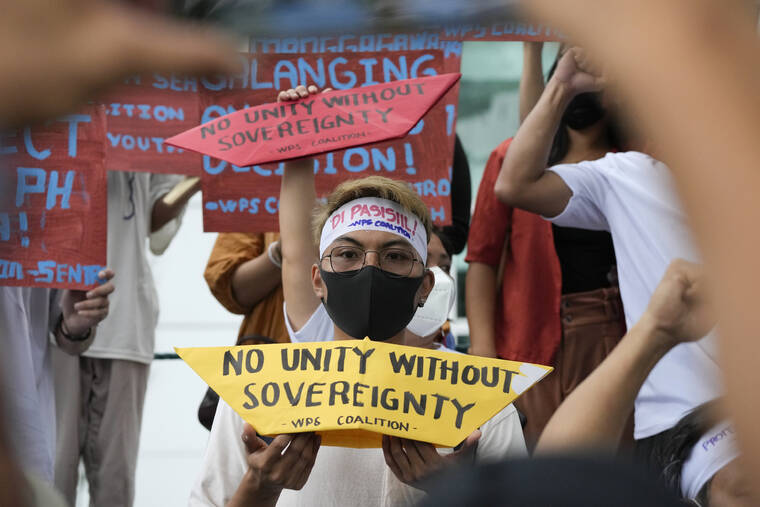US warns it will defend an ally if China breaks naval supremacy
MANILA >> US Secretary of State Antony Blinken again urged China to comply with a 2016 arbitration ruling that invalidated Beijing’s sweeping claims in the South China Sea, warning that Washington has an obligation to defend the Philippines partner if its armed forces, ships or planes come under attack in the disputed waters.
Blinken’s statement, issued by the US Embassy in Manila on Tuesday, was released on the sixth anniversary of a 2016 decision by a tribunal established under the United Nations Convention on the Law of the Sea in The Hague, following the Philippine government’s 2013 complaint against China’s increasingly aggressive actions in the disputed sea.
China did not participate in the arbitration, dismissing its verdict as a sham and continuing to oppose it, leading to territorial disputes with the Philippines and other Southeast Asian claimant states in recent years.
“We call again on the PRC to comply with its obligations under international law and to stop its provocative behavior,” said Blinken, using the acronym of China’s formal name.
“We also reiterate that an armed attack on Philippine forces, public ships or aircraft in the South China Sea would invoke U.S. mutual defense obligations under the 1951 U.S.-Philippines Mutual Defense Treaty,” Blinken said.
Aside from China and the Philippines, Vietnam, Malaysia, Taiwan and Brunei have overlapping claims in the busy waterway, believed to be rich in underwater gas and oil deposits and through which an estimated US$5 trillion worth of trade and commodities are shipped become year.
The troubled region has become a key front in the US-China rivalry.
Washington lays no claim to the disputed waters but has used its Navy ships and Air Force jets to patrol the waterway for decades and says freedom of navigation and overflight in the disputed region is in the US national interest. That has drawn angry reactions from China, which has accused the US of meddling in an all-Asian dispute and warned them to stay away.
Philippine Foreign Minister Enrique Manalo said on Tuesday that the arbitral award would be a pillar of the new government’s policies and actions in the disputed region, dismissing attempts to undermine the “indisputable” decision.
“These findings can no longer be denied and refuted, and are conclusive because they are undeniable. The award is final,” Manalo said in a statement.
“We firmly oppose attempts to undermine it … even erase it from the law, from history and from our collective memory,” said Manalo, who did not name China but clearly alluded to it.
China would likely frown on Manalo’s stated policy stance for the government of President Ferdinand Marcos Jr., who took office on June 30 after a landslide election victory.
Marcos Jr.’s predecessor, Rodrigo Duterte, deferred arbitration for years after taking office in 2016 and maintained close ties with Chinese President Xi Jinping while frequently criticizing US security policies.
In 2019, Duterte said he finally urged Xi to comply with the ruling at a meeting in Beijing, but was told flatly by the Chinese leader, “We will not back down.”
Marcos Jr. has upheld the arbitrator’s verdict, saying he would not allow even a “square millimeter” of Philippine water to be trampled on.
But in an interview with DZRH radio station in January, before he won the presidency, Marcos Jr. said that since China has refused to recognize the ruling, it would not help to settle disputes with Beijing, “so we don’t have that option.” is available”.
Marcos Jr. said at the time that Duterte’s policy of diplomatic engagement with China was “really our only option.”
He was called on Tuesday to urge China to comply with the arbitral award and reverse Duterte’s soft approach that undermined Philippine sovereignty in the disputed sea.
Dozens of left-wing activists and workers protested outside the Chinese consulate in Manila’s Makati financial district on Tuesday, calling on Beijing to respect the arbitration ruling and call on Marcos Jr. to defend the country’s territory and sovereign rights in the South China Sea.


Comments are closed.